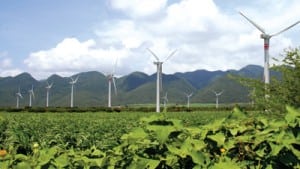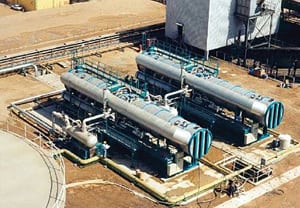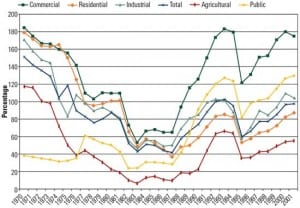-
Hydro
Power in Mexico: Renewables Remain More Desired than Real
Mexico has already developed substantial large hydro and geothermal resources. However, without policy changes and government-sponsored financial incentives, unconventional renewable sources are taking the equivalent of baby steps.
-
Coal
First Posiflow Benson Boiler Completes Seven Years of Service
Seven years have passed since the world’s first low mass flux vertical tube once-through furnace was put into operation by Doosan Babcock at the Yaomeng Thermal Power Plant Unit 1 in China. That boiler replaced a boiler of another design that had become unreliable. The operating experience with the Posiflow design has been so positive that the owner has since ordered and commissioned a replacement for Unit 2’s boiler. Here’s what makes this furnace design unique.
-
Coal
Adding Desalination to Solar Hybrid and Fossil Plants
Shrinking water supplies will unquestionably constrain the development of future power plants. A hybrid system consisting of concentrated solar thermal power and desalination to produce water for a plant, integrated with a combined cycle or conventional steam plant, may be the simple solution.
-
Environmental
Dry Injection of Trona for SO3 Control
In 2006 and 2007, POWER ran a three-part series on the formation of SO3, O&M issues caused by SO3, and sorbent injection control for SO3 control. Three years later, many plants still struggle with their SO 3 mitigation systems or remain undecided on which mitigation path to follow. This article explores the advantages of dry sorbent injection technology.
-
Nuclear
Resurrecting Nuclear: "We Have to Get It Right"
Offers of nuclear loan guarantees are pending, construction permit applications are at an industry high, and the political stars seem to be properly aligned. However, there remains one obstacle in the development path of the next-generation of nuclear plants: How will these plants be financed?
-
Business
Power in Mexico: A Regulatory Framework with Little Flexibility
Mexico’s federal government retains almost total control over who builds and owns what electricity infrastructure. But if you know how to work within the strict constraints, it is possible to engage in profitable projects.
-
General
Scientific Spam on Climate Health Effects
By Kennedy Maize Washington, D.C., April 28, 2001 — Having spent decades as a Washington reporter, I’ve read more government reports that I can count. Paper is policy currency in D.C. But this week’s interagency report – A Human Health Perspective on Climate Change – is the loopiest I can recall. This report, honchoed by […]
-
News
Kerry-Graham-Lieberman Bill Stalls as Graham Withdraws Support
The long-awaited Kerry-Graham-Lieberman bill saw more delays this week as Senator Lindsey Graham (R-S.C.) abandoned efforts to work with Senators John Kerry (D-Mass.) and Joseph Lieberman (I-Conn.) on the legislation, citing frustration with reports that indicated congressional leadership and the administration were prioritizing immigration over climate and energy legislation.
-
News
EPA Submits Final Tailoring Rule to White House OMB
The U.S. Environmental Protection Agency (EPA) last week sent its final so-called “Tailoring Rule” to the White House Office of Management and Budget (OMB) for review. The move signals that the rule, which could require power plants and other entities to obtain operating permits to emit greenhouse gases, is close to finalization.
-
News
Utah Backs Out of Western Cap-and-Trade Program
Utah is the latest state to announce that it will not participate in the Western Climate Initiative (WCI) when the regional cap-and-trade program begins in January 2012. Republican governor Gary Herbert’s office told reporters that the state would not entirely quit the initiative, even though the governor disagreed with some principles favored by it.
Search







